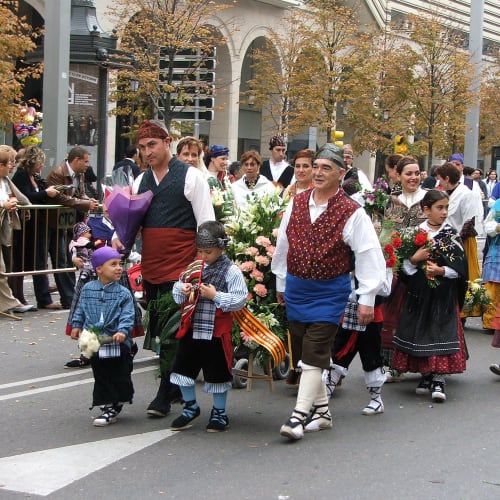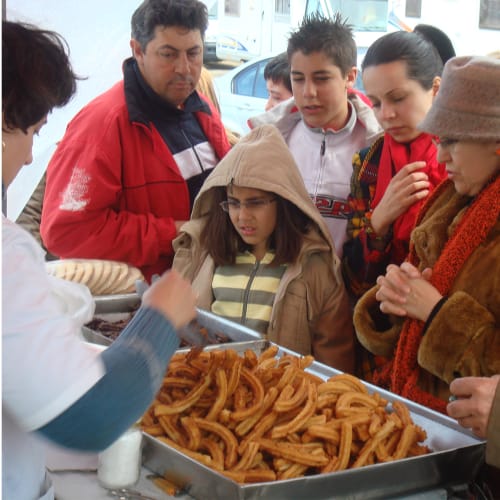Spain, Community and the New World
October 2009




Our son Christopher is an inveterate traveler. He and his wife Rian are US State Department diplomats who take every opportunity to travel to remote areas of the world. We have traveled with them to the rugged Caucasus Mountains of Armenia, to fortified monasteries in Serbia and the rain forest of Tikal in Guatemala. Chris and I even drove from Williamsburg through Mexico to Guatemala City (a zany idea!) Probably Chris caught the travel bug at infancy. When we were living in El Puerto de Santa María we would pop him and his two brothers Tim and Jonathan in the car any chance we got to continue our exploration of our beloved Spain! (No straps, harnesses or car seats in those days – and somehow they made it through.)

So it was no surprise that Ruth and I found ourselves traveling to remote areas of Romania last month. Chris and Rian lured us there with tales of fortified Saxon churches, orthodox monasteries covered with frescoes inside and out, and most of all, of the country people they met while staying in a tiny village not far from the Ukrainian border.
We met the people, visited their villages, passed their horse-drawn carts, dodged their sheep, cows and chickens which were strolling down the rugged small roads (one could not call them highways). We even had a rare opportunity to worship with villagers outdoors in their churchyard. It was a major feast day and their small wooden church could not hold them all. The long and elaborate Orthodox service was almost otherworldly: their native dress, ancient rituals and customs transported us to another kind of awareness.
And then it struck me that Ruth and I were experiencing something very familiar and close to our hearts: we were revisiting the country people, their villages and churches whose way of life we grew to appreciate during our early trips to Spain almost fifty years ago. These Romanians are rising out of the wreckage of wars and a series of totalitarian regimes as were the Spaniards when we first visited them. Life is rough and very basic for the Romanians today. Hunger is not a distant memory for them. Such was the case in rural Spain when we first visited the people of Galicia, Asturias, Extremadura, the Basque Country La Mancha, Andalucía – in fact all of Spain in the 1950’s and 1960’s.
Yet in our travels through Romania we could discern a spirit of hope, especially in the young, some of whom in recent years have worked in Spain in order to send money home to their families. I am sure the story sounds familiar to some of you whose roots are in Spain, especially those who fled Galicia, Asturias and the Basque County during hard times. Often what strikes me most as I live out my life is the resiliency of the human spirit.
Something else came to mind as Ruth and I drove many miles with our friends along the rugged roads of rural Romania. We saw fields of tall corn flourishing in the rich soil; and we saw the country people on their knees harvesting potatoes with hand hoes. When we ate the hearty food of the region in the local restaurants, we found that their cuisine was based on soups, potatoes, tomatoes, polenta (cornmeal pudding) and some meat. Sometimes the cook would garnish our plates with little peppers – sort of like the Spanish guindillas.
I remarked to my traveling companions, “Isn’t it remarkable that virtually all of the staples of their subsistence originated in the New World? Had Columbus not sailed from Pozo and Sanlúcar de Barrameda, the families here would not be harvesting potatoes and enjoying tomatoes and polenta. They would be subsisting on gruel made of millet or barley.”
Then we started taking it a little further. Our friends have been Spain enthusiasts for 40 years – since we met in Rota, so of course our thoughts turned to all of the food we love from Spain. The delightful Pimientos de Padrón peppers which we sizzle in our pans are a direct result of plants Christopher Columbus brought to Ferdinand and Isabella at the Monastery of Guadalupe.
Virtually all the peppers of Spain, piquillos, guindillas, and the unique smoked paprika pimentón de la Vera, owe their origin to the curiosity of the Spanish explorers. Can you imagine hundreds of chorizos and stews, without pimentón? We decided we could not imagine Spain without being able to purchase churros from the local stand and dip them in thick chocolate a la taza. What would Andalucía be like without chilled gazpacho and salmorejo made of red ripe tomatoes? No patatas fritas? Why, it wouldn’t be Spain!

Nowadays it is fashionable to emphasize our diversity – that which makes us different. Together with Martin Luther King, I find it much more reassuring to celebrate our common humanity. The Romanian people Ruth and I were with last month were building a better life grounded in their close families and their faith. Their future is bright, just as was the future of Spaniards whom we met forty five years before.
The 12th of October is a national holiday in Spain known as the Dia de la Hispanidad. Following tradition, King Juan Carlos and Queen Sofia will journey to the ancient Aragonese city of Zaragoza, to give thanks at the Basilica of Nuestra Señora del Pilar and participate in a variety of festivities which celebrate the contribution of Spain to the world at large. Villagers dressed in traditional costumes will process many miles, or even several days, to celebrate their unity as Spaniards. It is quite a splendid occasion.
The bridges built across the Atlantic from Spain to the New World have changed the world for the better. It certainly changed the possibilities of Ruth and my ancestors. Our families came to the New World too, and the cross fertilization we all have achieved in our common lives in America is a good thing.
The La Tienda community is a vivid example of how "the best of Spain" has brought people together. When we cook with Lola’s sofrito, or enjoy the olive oil that Fermín and Aixa blend; when we have a slice of Serrano ham prepared by Miguel Redondo’s family, or Ibérico from Santiago Martin’s family we are experiencing our common ties across the ocean. But more than that, when I and the La Tienda family receive and reply to your many personal notes it is a fulfilling way for all of us to share our common humanity.
This Columbus Day I am thankful for Christopher Columbus; for the courage and singleness of vision of that remarkable, if flawed, man. ¡Viva España and the millions of people who have been touched by the traditions of her culture!
Tu amigo,
Don

